Cognitive Behavioral Therapy, commonly known as CBT, is one of the most widely practiced and researched forms of psychotherapy today. Its success lies in its structured, goal-oriented approach that helps individuals identify and change unhelpful thinking patterns and behaviors. Whether you’re dealing with anxiety, depression, trauma, or daily stress, CBT offers practical tools that can make a real difference.
In this article, we’ll explore the key elements of CBT therapy, who it’s best suited for, and how you can get started with CBT therapy in Atlanta at Imagine Wellness Centers.
What Is CBT Therapy?
CBT stands for Cognitive Behavioral Therapy. Developed in the 1960s by psychiatrist Dr. Aaron Beck, CBT is grounded in the idea that our thoughts, emotions, and behaviors are deeply connected. If we can change how we think, we can change how we feel and behave.
CBT is evidence-based, meaning it has been rigorously studied and proven effective for a wide range of mental health concerns. It’s typically short-term and focused on current problems, making it a practical choice for many people looking for meaningful change.
Key Elements of CBT Therapy
-
Identifying Negative Thought Patterns
At the heart of CBT is the process of recognizing and challenging automatic negative thoughts. These thoughts often arise without us realizing and can distort how we interpret the world. For example, someone with anxiety may automatically think, “I’m going to mess up this presentation,” without evidence.
CBT helps individuals become more aware of these cognitive distortions—like catastrophizing, black-and-white thinking, or overgeneralization—and replace them with more realistic, balanced thoughts.
-
Challenging Core Beliefs
Beneath surface-level thoughts often lie deeply held beliefs about ourselves, others, and the world. These core beliefs (e.g., “I’m not good enough,” “People will always hurt me”) can fuel long-term emotional distress. CBT therapy works to uncover and reshape these beliefs through guided exploration and reflection. -
Behavioral Activation
CBT isn’t just about changing your thoughts—it’s also about changing what you do. Behavioral activation encourages people to engage in positive, rewarding activities even when they don’t feel like it. For those with depression, for instance, this might include scheduling enjoyable hobbies, reconnecting with friends, or breaking down tasks into manageable steps.
This element helps disrupt the cycle of avoidance and inactivity that often worsens mental health symptoms.
-
Skills Training and Problem-Solving
CBT equips clients with practical tools they can use in everyday life. These might include:
-
Relaxation techniques (e.g., deep breathing, progressive muscle relaxation)
-
Assertiveness training
-
Time management skills
-
Communication strategies
-
Coping tools for handling triggers and stress
The goal is to empower individuals to handle challenges more effectively and confidently.
-
Goal Setting and Homework
CBT is structured and goal-oriented. Clients often work with their therapist to set measurable, achievable goals and are given “homework” assignments to apply what they’ve learned in sessions. These assignments might include journaling, practicing new behaviors, or completing thought records.
This consistent application outside of therapy sessions accelerates progress and strengthens long-term results.
-
Focus on the Present
Unlike some therapeutic approaches that delve deeply into past experiences, CBT places more emphasis on current problems and how to solve them. That said, past experiences can still be relevant—particularly when they shape core beliefs—but CBT tends to prioritize the “here and now.”
Who Is CBT Therapy For?
CBT is a highly adaptable therapy that can benefit a wide range of individuals. It has been proven effective for:
-
Anxiety disorders (e.g., generalized anxiety, panic disorder, social anxiety)
-
Depression
-
PTSD and trauma-related disorders
-
Obsessive-compulsive disorder (OCD)
-
Phobias
-
Eating disorders
-
Insomnia
-
Substance use disorders
-
Chronic pain and illness-related stress
-
Relationship and interpersonal issues
-
Everyday stress, low self-esteem, and life transitions
CBT is also a great option for individuals who prefer a structured approach, enjoy setting and tracking progress toward goals, or appreciate having tangible tools to use outside of therapy.
It’s suitable for both adults and adolescents, and it can be done individually, in group settings, or even in couples or family therapy formats.
Benefits of CBT Therapy
-
Evidence-based and widely accepted
-
Short-term and time-efficient
-
Teaches practical coping tools
-
Promotes long-lasting change
-
Helps people become their own therapist over time
-
Can be combined with medication or other therapies when appropriate
Start CBT Therapy in Atlanta, GA at Imagine Wellness Centers
At Imagine Wellness Centers in Atlanta, we specialize in Cognitive Behavioral Therapy tailored to meet your unique needs. Our licensed CBT therapists in Atlanta, GA are trained in CBT and integrate it into a compassionate, supportive environment where you feel heard, understood, and empowered to grow.
Whether you’re struggling with anxiety, depression, or life stress, CBT can help you gain clarity, build resilience, and reclaim your sense of control. We work with adults, teens, and families across the Atlanta area, both in-person and through convenient virtual therapy sessions.
You don’t have to stay stuck in negative patterns. Let us help you rewrite your story—one thought at a time.
📞 Call us today at 678-872-2079
🌐 Schedule your CBT consultation at https://imaginewellnesscenters.com/
📍 Located conveniently in Midtown Atlanta

